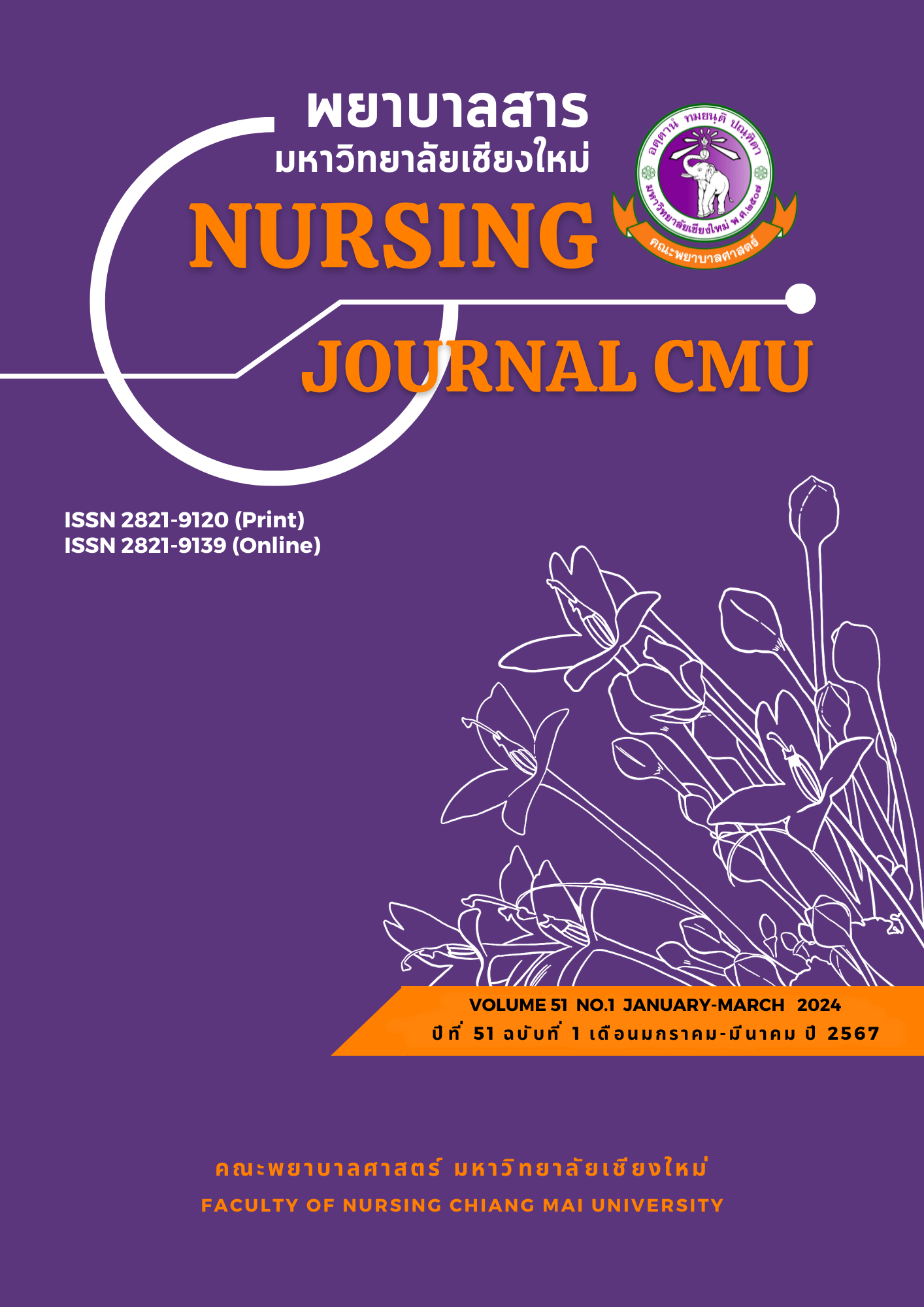Effects of a Positive Caring Aspect Enhancement Program on Positive Caring Aspects and Well-Being Among Caregivers of Older Persons with Chronic Disease
Keywords:
Caregivers of older persons, Chronic disease, Positive caring aspect, Well-beingAbstract
Chronic disease affects the disabilities of older people. The family caregiver is a key person in caring for older people with chronic diseases. This quasi-equivalent control group design aimed to evaluate the effects of a positive caring aspect enhancement program on positive caring aspects and well-being among caregivers of older persons with chronic disease. Fifty caregivers were selected by purposive sampling, and simple random sampling was used to assign them to an experimental group or a control group in equal numbers. The experimental group participated in the Program for Enhancing the Positive Caring Aspects for 6 weeks, while the control group received usual care. Data was collected using the Positive Aspects of Caregiving Questionnaire and the General Well-Being Schedule, and analyzed using descriptive statistics, one-way and two-way repeated measure ANOVA.
The results found that:
1. After the experiment, positive caring aspects in the experimental group were significantly higher than those before participation in the program (p <. 05) and were significantly higher than those of the control group (p < .05).
2. After the experiment, well-being in the experimental group was significantly higher than before participation in the program (p < .05) and was significantly higher than that of the control group (p < .05).
The results of this study suggest that a program for enhancing positive caring aspects can be applied to caregivers of older people with chronic diseases in communities.
References
Bom, J., Bakx, P., Schut, F., & van Doorslaer, E. (2019). The impact of informal caregiving for older adults on the health of various types of caregivers: A systematic review. The Gerontologist, 59(5), e629–e642.
Dupuy, H. J. (1977). The general well-being schedule. In I. McDowell & C. Newell (Eds.), Measuring health: A guide to rating scales and questionnaire (2nd ed., pp. 206-213). Oxford University Press.
Faronbi, J. O., Faronbia, G. O., Ayamolowoa, S. J., & Olaogun, A. A. (2019). Caring for the seniors with chronic illness: The lived experience of caregivers of older adults. Archives of Gerontology and Geriatrics, 82, 8–14. https://doi.org/10.1016/j.archger.2019.01.013
González-Rivera, J. A., & Rosario-Rodríguez, A. (2018). Spirituality and self-efficacy in caregivers of patients with neurodegenerative disorders: An overview of spiritual coping styles. Religions, 9(9), 276. https://doi.org/10.3390/rel9090276
Hanucharurnkul, S., Intarasombut, P., & Putwatana, P. (1989). Daily hassles, sense of coherence, general well-being among nursing faculty members of university. Journal of Nursing, 38(3), 169-190. (in Thai)
Kaewkerd, O., Chaiyasit, Y., Vibulchai, S., Kenthongdee, W., Sirisawat, M., Panput, A., Kotta, P., Chakansin, A., & Intarachaisri, S. (2020). Key factors of family adaptation to the Illness of family members: An integrative review. The Bangkok Medical Journal, 16(1), 95-101. (in Thai)
Khiewchaum, R., & Chase, J. D. (2021). Interventions to improve health and well-being among family caregivers of older adults with chronic illnesses: A scoping review. Journal of Gerontological Nursing, 47(5), 45-51.
Kramer, B. J., (1997). Gain in the caregiving experience: Where are we? What next? The Gerontologist, 37(2), 218–232.
Leung, D. Y. P., Chan, H. Y. L., Chiu, P. K. C., Lo, R. S. K., & Lee, L. L. Y. (2020). Source of social support and caregiving self-efficacy on caregiver burden and patient’s quality of life: A path analysis on patients with palliative care needs and their caregivers. International Journal of Environmental Research and Public Health, 17(15), 5457. https://doi.org/10.3390/ijerph17155457
Liu, H. Y., & Huang, L. H. (2018). The relationship between family functioning and caregiving appraisal of dementia family caregivers: Caregiving self-efficacy as a mediator. Aging & Mental Health, 22(4), 558-567. https://doi.org/10.1080/13607863.2016.1269148
Liu, C., Marino, V. R., Howard, V. J., Haley, W. E., & Roth, D. L. (2021). Positive aspects of caregiving in incident and long-term caregivers: Role of social engagement and distress. Aging & Mental Health, 27(1), 87-93. https://doi.org/10.1080/13607863.2021.2000935
Pankong, O., & Pothiban, L. (2018). Concept of positive aspects of caregiving: Adapted in caregivers of older person with dementia. Nursing Journal, 45(1), 159-170. (in Thai)
Pankong, O., Pothiban, L., Sucamvang, K., & Khampolsiri, T. (2018). A randomized controlled trial of enhancing positive aspects of caregiving in Thai dementia caregivers for dementia. Pacific Rim International Journal of Nursing Research, 22(2), 131-143.
Quinn, C., & Toms, G. (2019). Influence of positive aspects of dementia caregiving on caregivers’ well-being: A systematic review. Gerontologist, 59(5), e584-e596.
Rouch, S. A., Fields, B. E., Alibrahim, H. A., Rodakowski, J., & Leland, N. E. (2021). Evidence for the effectiveness of interventions for caregivers of people with chronic conditions: A systematic review. The American Journal of Occupational Therapy, 75(4), 7504190030. https://doi.org/10.5014/ajot.2021.042838
Tarlow, B. J., Wisniewski, S. R., Belle, S. H., Rubert, M., Ory, M. G., & Gallagher-Thompson, D. (2004). Positive aspects of caregiving: Contributions of the reach project to the development of new measures for Alzheimer’s caregiving. Research on Aging, 26(4), 429-453. https://doi.org/10.1177/0164027504264493
Wangpitipanit, S., Panuthai, S., Sucamvang, K., Lasuka, D., & Jitapunkul, S. (2016). Family caregiver capacity building program for older people with dependency in Thailand: A randomized controlled trial. Pacific Rim International Journal of Nursing Research, 20(1), 18-32.
Widagdo, T. M. M., Gulo, L. I., Cendrasilvinia, H., & Manus, W. C. (2022). Caregivers of elderly with moderate to total dependence in activities of daily living in Yogyakarta Indonesia: Correlation of burden and quality of life. Makara Journal Health Research, 26(3), 173-178. https://doi.org/10.7454/msk.v26i3.1359
Downloads
Published
How to Cite
Issue
Section
License
Copyright (c) 2024 Nursing Journal CMU

This work is licensed under a Creative Commons Attribution-NonCommercial-NoDerivatives 4.0 International License.
บทความที่ได้รับการตีพิมพ์เป็นลิขสิทธิ์ของวารสารพยาบาลสาร
ข้อความที่ปรากฏในบทความแต่ละเรื่องในวารสารวิชาการเล่มนี้เป็นความคิดเห็นส่วนตัวของผู้เขียนแต่ละท่านไม่เกี่ยวข้องกับมหาวิทยาลัยเชียงใหม่ และคณาจารย์ท่านอื่นๆในมหาวิทยาลัยฯ แต่อย่างใด ความรับผิดชอบองค์ประกอบทั้งหมดของบทความแต่ละเรื่องเป็นของผู้เขียนแต่ละท่าน หากมีความผิดพลาดใด ๆ ผู้เขียนแต่ละท่านจะรับผิดชอบบทความของตนเองแต่ผู้เดียว






